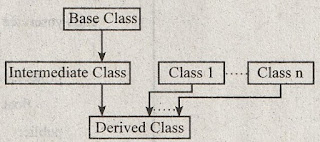5. Hybrid Inheritance
It is the combination of multi-level and multiple inheritance. Some program designing requires the involvement of two or more inheritance types, in such cases hybrid inheritance is used.

Figure: Hybrid Inheritance
Syntax
class A
{
--------
};
class B
{
--------
};
class C: visibility A, visibility B
{
--------
};
class D: visibility A
{
--------
};
Example
class Automobiles
{
//body
};
class cars : public Automobiles
{
//body
};
class Bicycle
{
//body
};
class Speed : public Cars, public
Bicycle
{
//body
};
Program
#include<iostream.h>
#include<conio.h>
class Employee
{
protected:
int id;
public:
void set_id(int);
void show_id(void);
};
void Employee :: set_id(int x)
{
id =x;
}
void
Employee :: show_id(void)
{
cout <<“Employee-id
is:”<<id<<endl;
}
class Salary : public Employee
{
protected:
float sal;
public:
void setSal(float);
void showSal(void);
};
void Salary :: setSal(float S)
{
sal = S;
}
void Salary :: showSal(void)
{
cout <<“Employee salary
is:”<<sal<<endl;
}
class yoservice
{
protected:
float yos;
public:
void setYrs(float y)
{
yos=y;
}
void showYrs(void)
{
cout <<“Years of
service:”<<yos<<endl;
}
};
class increment : public Salary,
public yoservice
{
private:
float inc;
public:
void show(void);
};
void increment :: show(void)
{
cout <<“Employee salary and
years of service are:” <<sal<<“”<<yos<<endl;
if (sal > 10000.00 &&
yos > 3.0)
{
sal = sal + 1000.00;
inc = sal;
cout <<“Salary with
increment is:”<<inc<<endl;
}
else
{
cout <<“No increment in
salary”<<endl;
}
}
void main( )
{
increment i, j;
clrscr();
iset_id(100);
i.show_id();
i.setSal(15000.00);
i.showSal();
i.setYrs(2.2);
i.showYrs( );
i.show();
j.set_id(101);
j.show_id();
j.setSal(25000.00);
j.showSal();
j.setYrs(5.0);
j.showYrs();
j.show();
getch();
return;
}
Output


